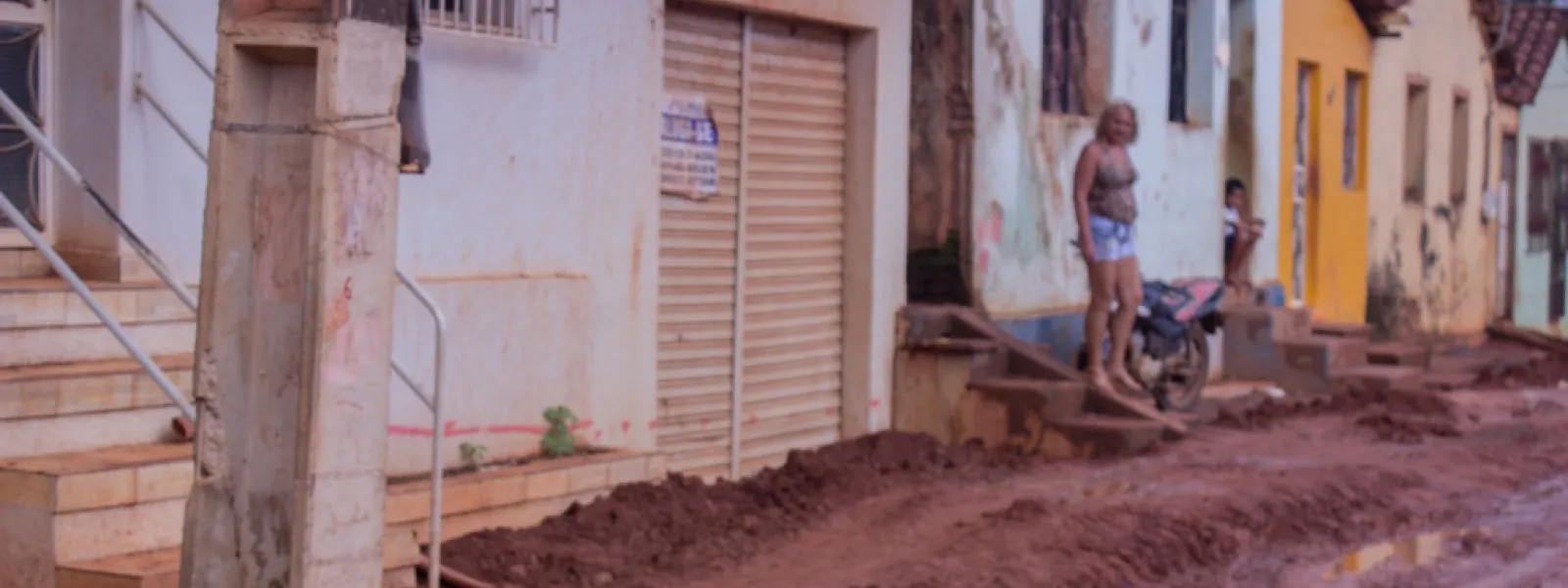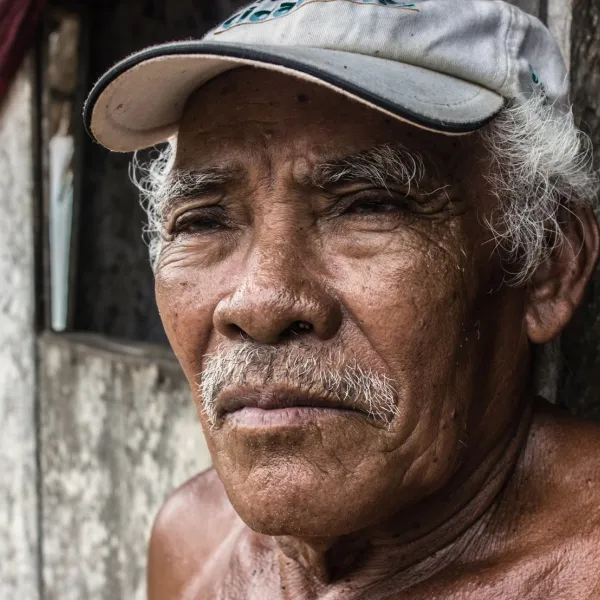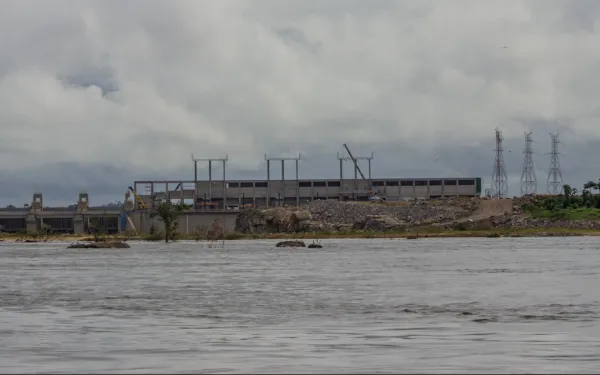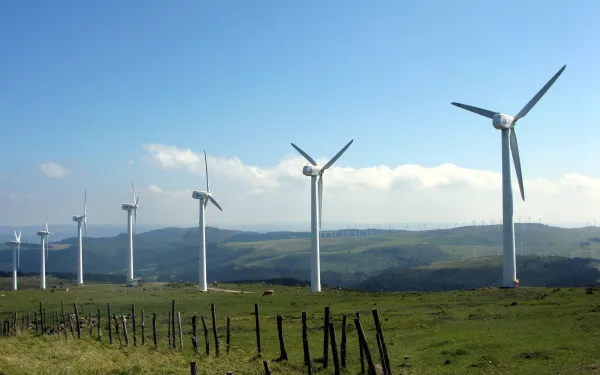
Project
Maíra Irigaray / Amazon WatchFazendo com que o Brasil se responsabilize pelos danos da represa Belo Monte
Quando em pleno funcionamento, Belo Monte será a terceira maior usina hidrelétrica do mundo, construída em um dos ecossistemas mais importantes do planeta: a floresta Amazônica. Localizada no rio Xingu, no Pará, um estado do norte do Brasil, o reservatório cobrirá mais de 500 quilômetros quadrados de florestas e terras agrícolas, uma área do tamanho da cidade de Chicago.
Para a população da Bacia do Xingu, a construção de Belo Monte tem significado a perda do acesso à água, à alimentação, à moradia, ao trabalho e ao transporte. Ao menos 20 mil pessoas serão deslocadas.
O governo e o consórcio encarregado do projeto começaram a construir a usina sem antes consultar primeiro as pessoas da região, muitas das quais são indígenas. Negligenciaram a normativa internacional de direitos humanos, a qual requer o consentimento prévio, livre e informado das comunidade indígenas afetadas. O Brasil também descumpriu as medidas cautelares outorgadas pela Comissão Interamericana de Direitos Humanos, as quais destinavam-se a proteger a vida, saúde e integridade das comunidades.
A represa começou a operar, ainda que não em plena capacidade. Recentemente um tribunal federal suspendeu a Licença de Operação do empreendimento devido à falta de cumprimento, por parte do consórcio, com as obras de saneamento básico em Altamira, cidade diretamente afetada pela hidroelétrica.
Consulta o expediente de fatos do caso
Partners:

Related projects
The declaration of Santurbán as a Regional Natural Park is a start toward complying with the prohibition on mining in páramos
FOR IMMEDIATE RELEASE February 7, 2013 Media contacts: Astrid Puentes Riaño, AIDA Co-Director, [email protected], +52-55 5212-0141 Paulo Bacca, AIDA Legal Advisor, [email protected], +57-1 232-4246 The declaration of Santurbán as a Regional Natural Park is a start toward complying with the prohibition on mining in páramos AIDA supports the decision and urges the Ministry of Environment to guarantee the protection of all páramo ecosystems. Bogotá, Colombia. The Interamerican Association for Environmental Defense (AIDA) welcomed the declaration of a portion of the Santurbán páramo in the Colombian departments of Santander and Norte de Santander as a Regional Natural Park. The measure, taken in January, reaffirms the prohibition on mining activities in Colombia’s páramo ecosystems, a move that helps improve the protection of these sensitive wetlands and critical carbon sinks. AIDA expressed its support for the creation of the park in a letter to the Ministry of Environment and Sustainable Development, the Alexander Von Humboldt Institute and the Autonomous Regional Corporation for the Defense of the Bucaramanga Plateau (CDMB) of Colombia, confirming that this act is congruent with the prohibition on mining in the region. It also reminded the government that this does not mean mining can be permitted in other parts of the páramo. The park declaration encompasses 11,700 of the 92,000 hectares of the páramo, and was proposed to the CDMB board of directors by Environment Minister Juan Gabriel Uribe based on a technical report issued by the Von Humboldt Institute. “At AIDA, we have spent more than five years highlighting the national and international obligation of the state to protect páramos. Although creation of the park is a good first step, we insist that the government comply with the law and ensure mining will be prohibited in the entire ecosystem”, said Paulo Bacca, a lawyer at the NGO. AIDA has worked to create and enforce the prohibition on mining in páramos, providing feedback on the Mining Code and related bills, and by following paradigmatic cases like Santurbán. It is a positive step that the Ministry of Environment, in accordance with constitutional and international commitments, has denied the environmental license requested by the Canadian company Greystar Resources Ltd. (now Eco Oro Minerals Corp.) to develop the Angostura gold mine in the heart of the páramo. “This issue goes beyond the legal arena. It is a matter of national security and the quality of life for Colombians given that the páramos are essential for the supply of 70% of drinking water, biodiversity conservation, climate change mitigation and even power generation”, said Astrid Puentes Riaño, co-executive director of AIDA. To prevent the lack of territorial demarcation from being used as justification for allowing mining projects in páramo areas, AIDA urges the Ministry of Environment to immediately make use of the new mapping of páramos provided to it by the Von Humboldt Institute a few months ago. The use of that mapping can help prevent mining companies from hiding behind the lack of a definition and demarcation of critical ecosystems like páramos to advance mining projects in areas where such activities clearly should not be permitted, thus furthering ecosystem and water resource protection critical to Colombian citizens. See the PDF version of the letter (Spanish only). For more information about the Angostura case and Santurbán páramo, please see: http://www.aida-americas.org/en/protecting_the_santurban_paramo_from_angostura_project
Read more
Open letter to the President of BNDES about funding for Belo Monte (Spanish only)
Excmo. Sr. Luciano Coutinho Presidente del Banco Nacional de Desarrollo Económico y Social – BNDES Río de Janeiro, Brasil Las organizaciones de la sociedad civil abajo firmantes, comprometidas con la defensa de los derechos humanos, el desarrollo con responsabilidad socioambiental y el fortalecimiento de la democracia, venimos respetuosamente a presentar las siguientes consideraciones y solicitar medidas urgentes ante el desembolso del préstamo anunciado por el BNDES para financiar el Complejo Hidroeléctrico de Belo Monte, en el Estado de Pará. Considerando que, de conformidad con la amplia documentación y estudios técnicos, existen fuertes evidencias de la inviabilidad económica del Complejo Belo Monte1, con base en factores como: i) el aumento constante de los costos del emprendimiento, que ya se multiplicó en casi 7 veces, de R$ 4.5 billones de reales en 2005 a R$ 19 billones en la época de la licitación en 2010, y actualmente está en aproximadamente R$ 28,9 billones conforme a datos del BNDES, pudiendo llegar a los R$ 32 billones, según analistas; ii) la reducida capacidad de generación de energía a lo largo de un año, aproximadamente apenas un 39% de su capacidad instalada de 11,2 mil MW; y iii) los verdaderos costos económicos asociados a la mitigación y compensación de impactos socioambientales que fueron crónicamente sub-dimensionados, en gran medida, a causa de presiones políticas por la aprobación de licencias ambientales, contrariando informes técnicos del propio IBAMA; Considerando que el BNDES firmó el 16 de junio de 2011 un primer préstamo puente por un valor de R$ 1,1 billones a favor del Consorcio Norte Energía S.A. (NESA), un segundo préstamo puente el 2 de julio de 2012 por un valor total de R$ 1,8 billones utilizando a la Caja Económica Federal (CEF) y al Banco ABC S.A. como prestamistas; y que el BNDES anunció el 26 de noviembre de 2012 la aprobación de un financiamiento por R$ 22,5 billones (el mayor préstamo de su historia) para Belo Monte, con la actuación del CEF y del BTG Pactual como bancos prestamistas de parte de los recursos,2 para sumar un total de R$ 25,4 billones; Considerando que los préstamos del BNDES a favor del consorcio Norte Energía están utilizando recursos públicos, oriundos del Programa de Integración Social y del Programa de Formación de Patrimonio del Funcionario Público (PIS-PASEP) y del Fondo de Garantía por Tiempo de Servicio (FGTS), asignados al Fondo de Amparo al Trabajador (FAT) y de la emisión de bonos del Tesoro Nacional en el mercado internacional (en los que la diferencia entre la tasa de interés pagada por Tesoro es aquella cobrada al BNDES y también cubierta por el contribuyente brasileño); Considerando que para la aprobación de los dos préstamos puente, por un valor total de R$ 2.9 billones, el BNDES exceptuó la realización de análisis de viabilidad económica y de clasificación de riesgo del Complejo Belo Monte, exigidos por la Resolución No. 2.682/99 de Consejo Monetario Nacional – CMN y no cumplió con las determinaciones de la Circular Nº 3547 de 07/07/2011/BACEN (D.O.U. 08/07/2011) en lo relativo a la necesidad de evaluación y cálculo de riesgo resultante de la exposición a los daños socioambientales del emprendimiento; Considerando que, a pesar de las determinaciones de las Resoluciones 2022/10 y 2025/10, aprobadas por la Dirección Ejecutiva, que instituyó la nueva Política de Responsabilidad Social y Ambiental y la nueva Política Socioambiental del Sistema BNDES, el Banco aún no cuenta con una guía socioambiental con directrices para orientar financiamientos para el sector hidroeléctrico, como herramienta para asegurar el cumplimiento de sus objetivos sociales, económicos y ambientales, en el marco de la legislación vigente; Considerando que el BNDES recibió notificaciones extra-judiciales firmadas por diversas organizaciones de la sociedad civil en octubre de 2010 y noviembre de 20113, con advertencias sobre los riesgos financieros, legales y de reputación a raíz de su involucramiento como financiador del Complejo Belo Monte; sin que eso haya provocado cambios efectivos en la postura del banco; Considerando el incumplimiento crónico de las condicionantes de las licencias ambientales (Licencia Previa No. 342/2010 y Licencia de Instalación No. 795/2011), como lo prueban las minutas del seguimiento de IBAMA y de la FUNAI, así como los relatos de organizaciones civiles y poblaciones afectadas, sin que eso haya afectado las decisiones del BNDES en cuanto al financiamiento de Belo Monte; Considerando las graves violaciones a los derechos humanos de los pueblos indígenas y de otras comunidades locales del Xingú y de la legislación ambiental, así como irregularidades en el cumplimiento de la legislación laboral por parte de NESA y empresas tercerizadas; Considerando los impactos socioambientales que la construcción de Belo Monte ya está provocando, como por ejemplo el desplazamiento forzado de agricultores familiares y ribereños sin compensación efectiva, afectación a la calidad del agua, mortalidad de peces y quelonios, aumento de la deforestación ilegal, invasión de tierras y explotación maderera ilegal, invasión de empresas mineras depredadoras (como la multinacional canadiense Belo Sun en la Volta Grande del Xingú), aumento de violencia y prostitución infantil, criminalización de defensores de derechos humanos en la región, así como la sobrecarga de los servicios de salud, saneamiento, educación y seguridad pública en áreas urbanas; sin medidas efectivas de solución a los problemas, en el ámbito de las condicionantes de licencias, el PDRS Xingú y las medidas cautelares solicitadas por la Comisión Interamericana de Derechos Humanos (CIDH); Considerando que el cuadro de ilegalidades de Belo Monte tiene como resultado, hasta el momento, la presentación de 15 acciones del Ministerio Público Federal, 21 acciones de la Defensoría Pública y 18 acciones de organizaciones de la sociedad civil; e internacionalmente la presentación de una petición y el otorgamiento de medidas cautelares por la Comisión Interamericana de Derechos Humanos en favor de las comunidades indígenas de la cuenca del Xingú; Considerando que el BNDES no posee hasta la fecha un sistema de monitoreo y evaluación del cumplimiento de condicionantes de licencias ambientales, de violaciones de derechos humanos y legislación ambiental y de otros impactos socioambientales de emprendimientos como Belo Monte, contradiciendo así el discurso de responsabilidad social y ambiental del banco; Considerando que un nuevo aporte de R$ 22,5 billones del BNDES, en el contexto actual de incumplimiento de obligaciones formales por parte de NESA, genera que el BNDES y otros órganos públicos intensifiquen enormemente los problemas de degradación ambiental y el sufrimiento de las poblaciones afectadas y amenazadas en la región afectada por Belo Monte; Solicitamos que no se realice ningún desembolso del préstamo de R$ 22,5 billones para Norte Energía S.A., anunciado el día 26 de noviembre de 2012 por el BNDES, antes de cumplir con las siguientes medidas urgentes, que constituyen, en su gran mayoría, obligaciones formales preexistentes del Banco: a) Demostración del pleno cumplimiento de las leyes nacionales e internacionales aplicables para hidroeléctricas y las directrices, criterios y demás compromisos del Protocolo de Intenciones para la Responsabilidad Socioambiental (Protocolo Verde) firmado por el BNDES en agosto de 2008; b) Esclarecimiento de los motivos para la inexistencia de una guía socioambiental con directrices para orientar inversiones en el sector hidroeléctrico, conforme a lo previsto en las Resoluciones 2022/10 y 2025/10 que instituyeran la nueva Política de Responsabilidad Social y Ambiental y la nueva Política Socioambiental del Sistema BNDES, así como una explicación sobre las medidas que el banco viene tomando y pretende implementar para que tales resoluciones sean cumplidas para el caso de Belo Monte; c) Criterios y métodos utilizados por el BNDES en el análisis de la viabilidad económica de Belo Monte - especialmente en lo que se refiere a los costos de construcción, producción y venta de energía, y costos de mitigación y compensación de impactos socioambientales – explicando los riesgos de perjuicios para las arcas públicas y el contribuyente brasileño y cómo el banco pretende sanearlos; d) Demostración de cumplimiento efectivo de la Resolución No. 2.682/99 del Consejo Monetario Nacional – CMN, relativa al análisis de viabilidad económica y de clasificación de riesgo del Complejo Belo Monte; e) Cumplimiento pleno de las determinaciones de la Circular Nº 3547 de 07/07/2011/BACEN (D.O.U. 08/07/2011) relativa a la necesidad de evaluación y cálculo de riesgo resultante de la exposición a los daños socioambientales del emprendimiento; f) Muestra de los análisis realizados por el BNDES respecto al grado de cumplimiento de condicionantes de licencias ambientales y sus implicaciones para la aprobación del préstamo principal; g) Esclarecimiento de los análisis realizados por el BNDES sobre el grado de cumplimiento de la legislación vigente en materia laboral y de derechos humanos, inclusive el derecho al consentimiento libre, previo e informado, conforme al artículo 231 de la Constitución Federal, el Convenio 169 de la OIT y la Declaración de los Derechos de los Pueblos Indígenas de las Naciones Unidas y las medidas cautelares otorgadas por la Comisión Interamericana de Derechos Humanos; h) Posicionamiento del BNDES sobre las más de 50 acciones interpuestas relativas a las ilegalidades en el licenciamiento e instalación del Complejo Belo Monte, y sus conclusiones en cuanto a las implicaciones del pasivo jurídico del emprendimiento para la aprobación del préstamo principal; i) Demostración de pleno cumplimiento del artículo 1, § 1º de la Ley 6.938/81, en lo que se refiere a la responsabilidad objetiva de los agentes financieros por los daños ambientales del emprendimiento, inclusive aquellos no previstos o asumidos en la Licencia Previa No. 342/2010. Señor Presidente, considerando la urgencia y relevancia de este asunto, inclusive para asegurar la coherencia entre los objetivos de responsabilidad social y ambiental del BNDES y sus operaciones en la práctica, solicitamos el máximo de atención y empeño en atender esta solicitud. En este sentido, solicitamos la realización de una reunión urgente de una delegación de las organizaciones signatarias de esta carta con Su Excelencia y su equipo, para tratar las cuestiones aquí planteadas y la implementación de las medidas urgentes propuestas. Altamira-PA, 4 de diciembre de 2012 See the full list of national and international organizations that signed the letter in the attached PDF version (spanish only).
Read more
The challenges of deploying wind energy in Mexico. The case of the Isthmus of Tehuantepec
To combat climate change, low-carbon projects such as wind farms must be promoted. But despite the urgency for renewable energy, these projects must be carried out in a sustainable and equitable fashion. This article is an open call to Mexico and the world to improve planning and development practices for renewable energy projects, helping to guarantee the respect of the human rights of affected communities. The Mexican government has authorized the development of at least 14 wind power projects on the Isthmus of Tehuantepec in Oaxaca, one of the poorest states in the country with a more than 34% indigenous population. The projects are backed by international investors including the Inter-American Development Bank and benefiting from the Clean Development Mechanism (CDM) of the Kyoto Protocol. Even so, a number of projects have caused negative social and environmental impacts that outweigh the benefits, threatening the human rights of local indigenous communities, including the right to free, prior, and informed consent for projects affecting their lands and livelihoods. The reason for this problem is that the Mexican government has not developed effective rules or mechanisms to regulate these investments. Without them, private companies have had to negotiate directly with local communities. There are other factors aggravating the situation, too: Locals lack information: Residents of the Isthmus of Tehuantepec say they have not received comprehensive and timely information about the projects. Some residents said in recent public forums that they were not told about the potential environmental impacts of the projects, such as those now affecting the possibility to cultivate their lands. Threats and violence against locals opposing the projects: For more than two years, the Jijot and Zapoteca communities have raised complaints about their leaders receiving threats and attacks by paramilitary groups and state officials seeking to silence any opposition to the development of wind farms. Lack of free, prior and informed consent: In the rush to grant permits and administrative permissions to wind power developers, the Mexican government has not fulfilled its obligation to consult local indigenous communities as guaranteed by international law. Unreasonable terms of land leases: A number of wind developers have signed contracts with local communities that offer paltry payments for the use of their land. Locals have complained about the lack of a process for negotiating on fair and equal terms. Absence of comprehensive and community-wide benefits: Some wind projects lack a comprehensive environmental and social development plan, meaning that they only benefit a fraction of the population: mostly investors and the companies that will buy the energy. While some locals have leased their lands at reasonable prices, the payments haven’t brought the promised development. Environmental impacts: Some projects have caused extensive environmental damage, yet studies to identify, prevent, and alleviate these damages have never been carried out. Impacts include the burning of large swaths of pastureland (a cause of greenhouse gas emissions), mangrove deforestation, and the destruction of migratory bird habitats. To mitigate the social and environmental impacts and avoid the violation of human rights during the development of wind farms, the following actions are suggested: Create a protocol for wind power development that guarantees the respect for human rights. The protocol should be observed in all relevant public policies. And it must meet the following standards: include criteria and indicators to verify the fulfillment of all environmental and social conditions; incentivize economic growth in the region, particularly to the benefit of non-landowners; promote collaboration between private developers, state and local governments, and local communities. Guarantee that all stakeholders and affected communities receive timely, comprehensive and clear information on the projects. The communities have the right to free, prior, and informed consent, and this must be observed. Their decisions must be respected even if they oppose a wind farm. Stakeholders should also seek opportunities to benefit local communities, including through job creation and the support of communal projects. Elaborate and implement a process for measuring the externalities of the projects, in which Mexico’s Federal Electricity and Hydrocarbons Regulator will evaluate sustainability based on independent assessments. If a development fails to benefit local communities, the wind farm must be prohibited from accessing the electricity grid to sell output. As representatives of civil societies working to protect the environment and affected communities, we want to raise awareness about the possible negative impacts of wind farms on communities and promote better practices. We will continue to help affected communities in search of justice and equity. About the authors: The Interamerican Association for Environmental Defense (AIDA) is a nonprofit environmental law organization that works across international borders to defend threatened ecosystems and the communities that depend on them. Its mission is to strengthen people's ability to guarantee their individual and collective right to a healthy environment through the development, implementation, and effective enforcement of national and international law. Contact information: [email protected] The Mexican Environmental Law Center (CEMDA) is a nonpartisan civic organization that promotes environmental protection and the right to a healthy environment. Its work contributes to the effective implementation of legislation, improvement of public policies, and the strengthening of legality and the rule of law. Its objective is to achieve better social welfare conditions in harmony with nature. Contact information: [email protected]
Read more